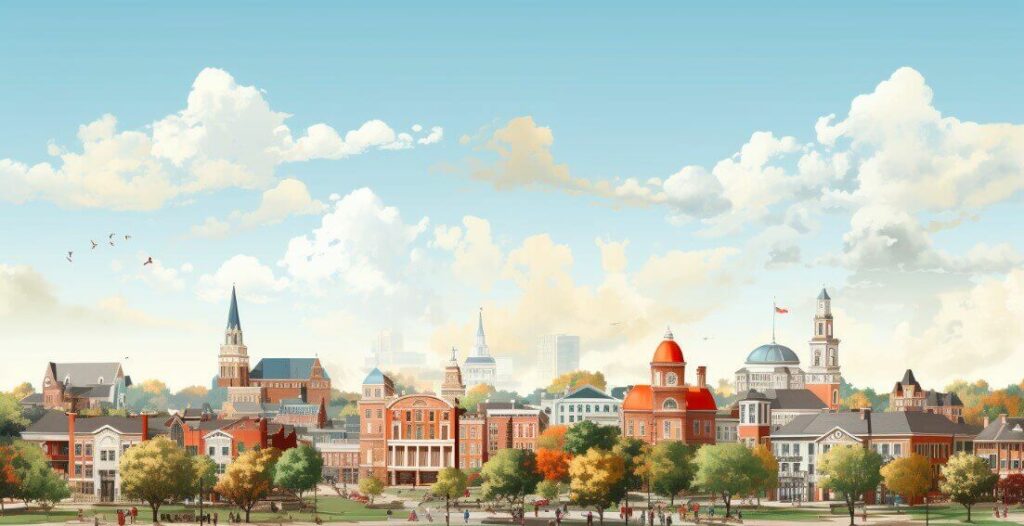This article provides a comprehensive overview of the history of Denton, Texas, from its founding to its development as a thriving college town.
The city, named after John B. Denton, experienced slow growth in its early years but saw significant expansion with the construction of railroads in the 1880s.
The establishment of North Texas Normal College and the Girls Industrial College further contributed to Denton’s growth and cultural development.

This article also examines the city’s education system, water supply, and the impact of manufacturing companies on its economy.
Founding and Early Years of Denton
Denton was established in 1857 as the county seat of Denton County, named after John B. Denton, with 100 acres of land donated for its establishment.
The city was incorporated in 1866, with J.B. Sawyer serving as the first mayor.
Denton experienced slow growth in the early years, with a population of 361 in 1870 and 1,194 in 1880.
However, the construction of railroads in the 1880s played a significant role in the city’s growth.
Denton became a college town with the establishment of North Texas Normal College (now the University of North Texas) in 1890 and the Girls Industrial College (now Texas Woman’s University) in 1903.
These institutions profoundly impacted Denton’s cultural and economic life, with enrollment reaching almost 25,000 students by the 1980s.
The universities’ presence influenced Denton’s character more than any other factor.
Influence of Colleges on Denton’s Development
Establishing universities in Denton significantly impacted the city’s cultural and economic development.
The North Texas Normal College, now known as the University of North Texas, was founded in 1890, followed by the Girls Industrial College, now Texas Woman’s University, in 1903.
These universities played a crucial role in shaping Denton’s character and attracting a diverse student population.
By the 1980s, the universities accounted for half of Denton’s population, with an enrollment of nearly 25,000 students.
The presence of these institutions fostered a vibrant arts and music scene and promoted innovation and intellectual growth within the city.
Additionally, the universities provided employment opportunities and contributed to Denton’s economic prosperity.
Education and Media in Denton
Education in Denton began with subscription schools taught in local churches and the Masonic Lodge building.
Later, in 1884, the first public school offering secondary and elementary education opened.
This public school became affiliated with the University of Texas in 1894.
Denton’s education system continued to evolve with the establishment of North Texas Normal College (now the University of North Texas) in 1890 and the Girls Industrial College (now Texas Woman’s University) in 1903.
These universities had a significant impact on Denton’s cultural and economic life. By the 1980s, they provided half the city’s population, with an enrollment of almost 25,000 students.
The universities also played a crucial role in diversifying the student body, attracting Black and international students by the 1980s.
Regarding media, Denton had subscription schools taught in churches and the Masonic Lodge building in its early days.
The Denton Review, the earliest city newspaper, was succeeded by the Denton Monitor in 1868.
The Denton Record and Chronicle combined in 1899 and became the only daily newspaper in Denton.
Water and Utilities in Denton’s History
In Denton’s early years, water and utilities relied on deep artesian wells until the 1950s.
The city obtained its water supply from these wells, which tapped into underground water sources.
Read more: Exploring Outdoor Delights in Denton
However, in 1950, Denton declined a contract with Dallas for water storage in Lake Dallas.
Instead, Denton later acquired water storage in Lewisville Lake in the 1950s and contracted for water from Lake Ray Roberts in the 1980s.
Since 1905, the city has owned both water and electric utilities.
This shift from deep artesian wells to more extensive water storage facilities demonstrates Denton’s commitment to ensuring a reliable water supply for its growing population.
Growth and Economy of Denton
Rapid growth from 1960 to 1980 in Denton was fueled by factors such as its proximity to Dallas and Fort Worth and its excellent interstate highway connections.
The opening of Dallas-Fort Worth International Airport in 1974 also brought new residents to Denton.
The presence of universities, such as the University of North Texas and Texas Woman’s University, contributed to population growth.
These universities not only provided educational opportunities but also influenced the character of Denton.
Additionally, the Denton State School and the establishment of manufacturing companies like Victor Equipment Company and Peterbilt provided increased employment opportunities.
Denton’s growth and economic development period significantly shaped the city as it transitioned from a small town to a thriving and innovative community.